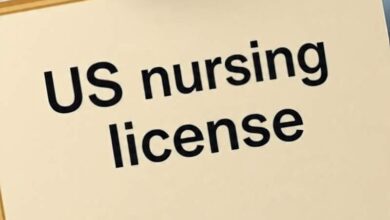Breaking News: Compact Nursing States in US 2025 – Updated List You Must See

Breaking News: Compact Nursing States in US 2025 – Updated List You Must See
The Compact Nursing States in US 2025 have become one of the most important topics for registered nurses, nursing students, and healthcare recruiters alike. If you’re a nurse planning to relocate, explore travel nursing, or expand your career options across state lines, knowing which states are part of the Nurse Licensure Compact (NLC) is absolutely essential.

The NLC allows nurses to practice in multiple participating states with just one multistate license—saving time, money, and paperwork. In 2025, new updates and changes have reshaped the list of compact states, and staying informed could make or break your next career move.
When I first considered moving from one state to another as a new nurse, I was surprised by how complicated the licensing process could be. Each state had different rules, fees, and waiting periods, which left me feeling stuck and overwhelmed. But once I discovered the Nurse Licensure Compact, everything changed. Suddenly, I could apply for travel nursing assignments, move to a new city, or even work across state borders without repeating the entire licensing process. Many Nigerian and international nurses working in the US also rely on compact states to expand their opportunities faster.
In this guide, we’ll provide the most up-to-date list of Compact Nursing States in US 2025, highlight the latest additions, and explain what these changes mean for your nursing career. Whether you’re a recent graduate, an experienced RN looking for flexibility, or a nurse exploring travel contracts, this article will give you the clarity and direction you need. By the end, you’ll not only know which states are part of the compact, but also how to make the most of this powerful license agreement to maximize your career growth in 2025 and beyond.
What is the Nurse Licensure Compact (NLC)?
Before diving into the updated list of Compact Nursing States in US 2025, it’s important to understand exactly what the Nurse Licensure Compact (NLC) is and why it matters for nurses.
The Nurse Licensure Compact is an agreement between participating states in the US that allows registered nurses (RNs) and licensed practical/vocational nurses (LPNs/LVNs) to hold one multistate license and legally practice in all other compact states. This means you don’t have to go through the time-consuming and costly process of applying for a new license every time you move or accept a job in another state.
For example, if you are licensed in Texas (a compact state), you can work in Florida, Arizona, or any other compact state without additional applications or fees. This flexibility is especially valuable for:
-
Travel nurses who take short-term contracts across different states.
-
Nurses living near state borders who may want to work in a neighboring state without juggling multiple licenses.
-
Healthcare employers who need a larger pool of nurses to fill critical staffing shortages quickly.
The NLC was created to improve nurse mobility, strengthen access to healthcare, and provide more options for both nurses and patients. As of 2025, more states have joined the compact, making it easier than ever for nurses to expand their careers without being limited by state lines.
In short, the Nurse Licensure Compact removes barriers, reduces red tape, and provides freedom for nurses to practice where they’re needed most. For many, it’s a career game-changer.
Complete Guide: Ethical Issues Around Patient Resources / Healthcare Disparities in US 2025
Updated List of Compact Nursing States in US 2025
The most important question for nurses exploring multistate licensure is simple: Which states are currently part of the Nurse Licensure Compact in 2025? As of this year, more than 40 states and territories have enacted or implemented the NLC, with a few still pending legislation.

This expansion makes it easier than ever for nurses to practice across the country with just one license.
Here is the updated list of Compact Nursing States in US 2025 (implemented and active):
-
Alabama
-
Arizona
-
Arkansas
-
Colorado
-
Delaware
-
Florida
-
Georgia
-
Idaho
-
Indiana
-
Iowa
-
Kansas
-
Kentucky
-
Louisiana
-
Maine
-
Maryland
-
Mississippi
-
Missouri
-
Montana
-
Nebraska
-
New Hampshire
-
New Jersey (implemented January 2025)
-
New Mexico
-
North Carolina
-
North Dakota
-
Ohio
-
Oklahoma
-
South Carolina
-
South Dakota
-
Tennessee
-
Texas
-
Utah
-
Virginia
-
West Virginia
-
Wisconsin
-
Wyoming
States with Pending NLC Legislation in 2025:
Some states have passed legislation but are still finalizing implementation, including Alaska, Massachusetts, Michigan, and Pennsylvania. Nurses in these states should monitor their state board of nursing websites for the latest updates.
Why This Matters in 2025
For nurses, this list isn’t just informational—it’s practical. If you’re considering travel nursing, relocating for family, or simply want more career flexibility, being licensed in one of these compact states gives you immediate access to dozens of job opportunities across state lines.
Benefits of Compact Nursing States in US 2025 for Nurses
The Compact Nursing States in US 2025 provide significant advantages for nurses who want flexibility, growth, and wider career opportunities.

Whether you’re a new graduate or an experienced RN, holding a multistate license can make a big difference in your professional journey.
1. Career Flexibility
With a compact license, you can easily move between participating states without having to reapply for new credentials. This is especially valuable if you plan to relocate, work across borders, or explore different parts of the country.
2. Travel Nursing Opportunities
Travel nursing continues to grow in popularity in 2025, and many agencies specifically recruit nurses with compact licenses. This means you can accept short-term contracts in high-demand areas, enjoy higher pay, and experience new locations without licensing delays.
3. Faster Employment Process
Employers prefer nurses with compact licenses because they can start working right away. This eliminates long waiting periods caused by paperwork, which is a major advantage for both hospitals and nurses seeking immediate work.
4. Cost Savings
Applying for separate licenses in multiple states is costly and time-consuming. With one compact license, you save money on application fees, renewals, and verification processes while reducing stress.
5. Support for Rural and Underserved Areas
Compact states often rely on mobile nursing staff to cover shortages in rural or underserved communities. Nurses with multistate licenses can step in quickly where they are needed most, expanding access to healthcare.
6. Professional Growth and Networking
Working across different states allows nurses to expand their clinical experience, develop new skills, and build a professional network across the US. This can open doors to leadership roles and advanced career opportunities.
In short, the Compact Nursing States in US 2025 are not just about convenience—they are about creating more freedom, reducing barriers, and helping nurses thrive in a constantly changing healthcare system.
Urgent Update: Nursing Shortage in the US 2025 – What’s Driving It and the Best Solutions
Challenges and Limitations of Compact Nursing States in 2025
While the Compact Nursing States in US 2025 offer enormous benefits, it’s important to recognize that they also come with challenges. Nurses should understand the limitations of the Nurse Licensure Compact (NLC) before making career decisions.
1. Not All States Are Compact Members
As of 2025, a handful of states—such as California, New York, Oregon, and Washington—are not part of the NLC. Nurses planning to work in these non-compact states will still need to apply for a separate license, which can be time-consuming and costly.
2. Varying State Laws and Practice Regulations
Even with a multistate license, nurses must follow the laws and scope of practice in each state where they work. For example, what is permitted in Texas may not be allowed in Ohio. Failure to comply with state-specific rules can lead to disciplinary action.
3. Background Checks and Eligibility
To qualify for a compact license, nurses must declare a primary state of residence (PSOR) in a compact state. They must also meet certain background check and disciplinary requirements. Nurses who don’t meet these criteria may be limited to single-state licenses.
4. Employer Preferences
While many employers prefer nurses with compact licenses, not every healthcare facility automatically accepts them without additional verification. Some hospitals may still have internal onboarding requirements, which could cause slight delays in starting work.
5. Pending and Delayed Implementation
States that have passed compact legislation but have not fully implemented it can create confusion. Nurses may mistakenly assume they can practice in these states when the law has not yet gone into effect.
6. Limited Global Recognition
The compact is only valid in the US. Internationally educated nurses can benefit from it once licensed in a compact state, but the NLC does not replace visa requirements or global nursing standards.
While these limitations exist, the advantages of the Compact Nursing States in US 2025 far outweigh the challenges. Nurses who plan carefully and stay updated on state laws can maximize the benefits of their multistate license.
Breakthrough: What is the easiest process to move spouse and children as a Nurse from Nigeria 2025
How to Apply for a Compact Nursing License in 2025
For nurses eager to take advantage of the Compact Nursing States in US 2025, understanding the application process is essential. Fortunately, applying for a compact license is straightforward, provided you meet the eligibility requirements.
Step 1: Confirm Your Primary State of Residence (PSOR)
You must legally reside in a compact state and declare it as your primary state of residence. This is usually proven by your driver’s license, tax records, or voter registration. Without residency in a compact state, you cannot obtain a multistate license.
Step 2: Hold an Active, Unencumbered License
Your nursing license in your primary state must be active and free from disciplinary actions. Any restrictions or encumbrances may disqualify you from receiving a multistate license.
Step 3: Complete Background Checks
Most compact states require both state and federal background checks with fingerprinting. This step ensures safety and consistency across all participating states.
Step 4: Submit Application to Your State Board of Nursing
Apply directly to your state board of nursing (BON) for a multistate license. Each state may have slightly different fees, forms, and processing times, but the general process remains the same.
Step 5: Pay Required Fees
Application and renewal fees vary by state. While obtaining a compact license is cost-effective in the long run, nurses should be prepared for initial processing charges.
Step 6: Verify Your Multistate Privilege
Once approved, your license status will indicate “multistate” in the Nursys database (the official verification system for nursing licenses). Employers can quickly confirm your eligibility to work across compact states.
Step 7: Stay Informed and Renew On Time
Multistate licenses must be renewed in your primary state of residence. If you move to another compact state, you will need to apply for a license in your new PSOR.
By following these steps, nurses can unlock the freedom and flexibility that come with a compact license. For many, this process is the gateway to career growth, travel nursing opportunities, and expanded job security.
How Nurses Can Get a US Green Card in 2025: Step-by-Step Sponsorship Guide
Future Outlook of Compact Nursing States in US Beyond 2025
The Compact Nursing States in US 2025 already cover most of the country, but the future promises even more growth and transformation.

As healthcare demands increase and nurse shortages continue, experts predict that the Nurse Licensure Compact (NLC) will play an even greater role in shaping the workforce.
1. Expansion to More States
Several states, including California, New York, and Washington, have historically resisted joining the compact due to policy or union concerns. However, with rising demand for nurses, pressure from healthcare systems, and legislative changes, there is a growing chance these states will adopt the NLC in the coming years.
2. Stronger Federal Support
While the NLC is managed state by state, there is speculation that future federal initiatives could encourage or incentivize more states to join. This would streamline licensing even further and reduce delays in responding to national healthcare crises.
3. Integration with Technology
By 2030, nursing licenses may be tied more closely to digital platforms, blockchain verification, and AI-powered systems that make license checks faster and more secure. This would strengthen trust between states and employers while simplifying compliance.
4. More Opportunities for Travel Nursing
With healthcare systems continuing to face staffing shortages, travel nursing will remain a high-demand career option. Compact states will provide the backbone of this mobility, ensuring nurses can quickly fill urgent gaps where they are needed most.
5. International Implications
Although the NLC currently applies only within the US, the success of compact agreements may inspire similar regional compacts in other parts of the world. For internationally educated nurses, this could mean easier transitions into US healthcare if licensing pathways become more globally aligned.
In short, the future of Compact Nursing States in the US looks promising. With more states expected to join and technology making the process smoother, nurses will have greater freedom, flexibility, and opportunities than ever before.
Are Nursing Jobs in the Cannabis Industry a Legitimate and Rewarding Path in the US 2025?
Conclusion
The Compact Nursing States in US 2025 have reshaped how nurses practice across the country, offering unprecedented flexibility, mobility, and career growth. For nurses, this means fewer licensing barriers, faster job placements, and the chance to work in multiple states without going through costly and time-consuming applications. For patients and healthcare systems, it means a stronger, more responsive workforce ready to meet urgent care needs.
If you’re a nurse planning your career in 2025 and beyond, staying updated on the Nurse Licensure Compact (NLC) is essential. Knowing which states are part of the agreement can open doors to travel nursing, remote opportunities, and long-term career advancement.
The future looks bright—more states are expected to join, technology will streamline licensing processes, and demand for nurses will only continue to grow. By leveraging the opportunities offered by compact states, nurses can maximize their earning potential, expand their professional reach, and provide quality care where it’s needed most.
Resources and Official Links
To make the most of the Compact Nursing States in US 2025, it’s important to rely on official and credible resources. These platforms provide updated information, state-specific requirements, and the latest NLC membership changes. Here are the best places to stay informed:
-
Nurse Licensure Compact (NLC) Official Website (NCSBN): https://www.ncsbn.org/nlc – This is the official page of the National Council of State Boards of Nursing (NCSBN), offering current lists of compact states, FAQs, and licensing updates.
-
State Board of Nursing Websites: Each state’s nursing board publishes its own licensing rules and application procedures. Check directly with the board if you’re moving or planning to work in a new state.
-
American Nurses Association (ANA): https://www.nursingworld.org – A reliable source for nursing advocacy, education, and policy updates that impact interstate practice.
-
Travel Nursing Agencies: Agencies such as Aya Healthcare, Cross Country Nurses, and AMN Healthcare often post compact-state opportunities and can guide you through licensing.
-
Official Nursing Journals and News Outlets: Sources like Nurse.org and HealthLeaders Media frequently cover compact state updates and their impact on workforce mobility.
By keeping these resources handy, nurses can make informed career decisions, avoid misinformation, and take full advantage of the opportunities compact states provide in 2025.




